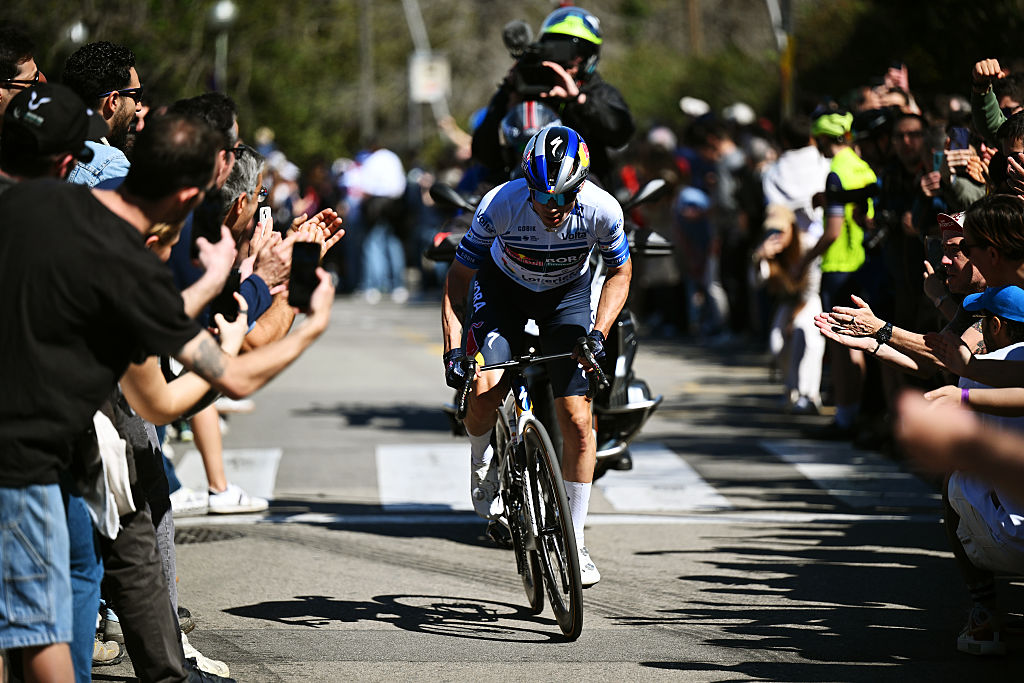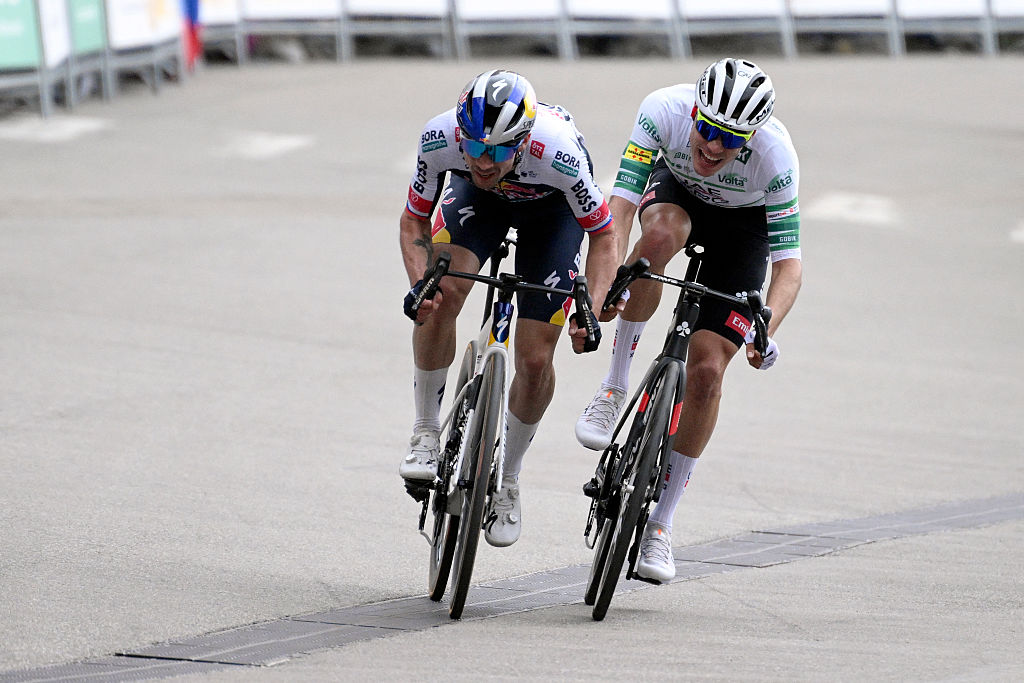The inevitable march: A vintage Primož Roglič performance at Volta a Catalunya - Philippa York analysis
Seven-day race offered a test of mental and physical resistance, and a reminder of the basics of professional cycling

Every once in a while, we are reminded of the basics of professional cycling. The riders who set the standards of stardom are there because they don’t like losing and at certain races a new face emerges who is beginning their quest of climbing the slippery slope to be one of those stars.
An event about a week in length is the ideal platform for these circumstances, not too long that they become a trial of endurance but not limited to one type of athlete. A bit of flat, a bit of climbing, some varied terrain and a time trial that’s 20-30 minutes of suffering.
Lately, the tendency has been towards more and more climbing, however, the results are often the same: strong, in a good team, in good condition. The basics sound all too easy to achieve but, in practice, are a test of mental and physical resistance. The pre-Classic period frequently has bad weather, and after that, it’s allergies time, and the first heat, and then in summer scorched by the sun. Any vulnerability is exposed.
Primož Roglič is the archetypical rider for these races. He’s won all of the ones that matter in professional cycling. Tirreno-Adriatico through to Critérium du Dauphiné, only the Tour de Suisse eludes him, and that’s because he’s never ridden it.
When he started this Volta a Catalunya, he wasn’t the big favourite as that responsibility fell upon the shoulders of Juan Ayuso, who already had four wins in 2025, including the GC at Tirreno. Here on the young Spaniards' home turf, questions were being posed regarding Roglič’s place in the hierarchy after his recent outing in Portugal was decidedly average.
Was this the year that age, wear and tear and the inevitable march of time caught up with the five-time GT winner?
Surely, one of the UAE Team Emirates-XRG machines would triumph again. Tadej Pogačar might have been absent, but with Soler, Ayuso, Adam Yates and Pavel Sivakov, their options were numerous, and that’s discounting rival team leaders like Enric Mas, Simon Yates and Ben O’Connor.
Get The Leadout Newsletter
The latest race content, interviews, features, reviews and expert buying guides, direct to your inbox!
However, out on the road, this 91st running of Spain’s old race - Volta a Catalunya - came down to a simple two-man battle. Ayuso versus Roglič: young versus old-ish. The current best men's team against the squad that intends to replace them.
The contest between the two became properly personal from the first mountain top finish when Roglič unleashed his usual devastating sprint in sight of the finish only for Ayuso to sneak up the inside of him and take the victory and with it the race lead. The Slovenian had assumed that no one would be able to follow his acceleration, so the impertinence of Ayuso’s unexpected pass must have stung deeply.
The next day, the wrong was righted, and Roglič was back in the lead, equal on time with Ayuso, but the scene was set from then on; every second mattered, and every opportunity would be taken.

The classic situation of the young pretender pitted against the established benchmark, squabbling over bonuses on the road and at the finishes, saw the leader’s jersey change hands and then be wrestled back again. Elbows out, teammates getting involved, and day-long tension became the norm.
Then the critical big mountain top finish of stage 6 at Queralt was removed due to dangerous weather and that meant the finale in Barcelona held even more the promise of an epic tete-a-tete between the two protagonists. With a one-second deficit, Roglič’s set about collecting the bonus sprints on the last day only to be countered on the next by Ayuso, surprising the Red Bull collective.
Montjuic was then set for the showdown. On paper, UAE had the manpower to control the situation, but the Barcelona circuit was brutal, and so it proved fatal for Juan Ayuso. Maybe he was finally paying for his recent efforts at Tirreno, or maybe it was the superior explosiveness of Roglič that proved his undoing, but with three laps to go, the Slovenian attacked, and the final lesson was taught.
Primož Roglič is never out of the fight until you crush him; he will grind you down if he’s still involved for the victory. This attack was the perfect example; given 20 seconds, he settled into TT mode, and no one could close that gap. Marc Soler tried to help, Adam Yates followed that push and even an Enric Mas on his favourite terrain could only get halfway to the Red Bull leader and then blew.
Ayuso’s resistance was as futile as it was ineffective to what was a vintage Primož Roglič performance. Older? Yes, but on the way out, certainly not.
Ayuso can win La Volta one day, it just wasn’t going to be this one. It became quite clear from the first day that Red Bull and Roglič came to Catalunya on a mission to see if he, and the team, was on the right path for the Giro d’Italia. They got the answer they wanted.
At the other end of the career scale, there was the arrival of Matthew Brennan onto the sprinting scene. Having already brought himself into view with his victory at GP Denain, two stages win at WorldTour level opened eyes even further, and it could have been a hat trick if it wasn’t for fellow Brit Ethan Vernon holding him off on the fourth day.
The opening stage was as gruelling as it gets, with two times along the coast into Sant Feliu, but Brennan proved he was the strongest there on the uphill rise to the finish, taking back Tibor del Grosso in the last ten metres and, more importantly, leaving Kaden Groves stuck on his wheel. Then his second win showed he was fast and super-explosive inside the final 100 metres. If he keeps up that level, he’ll be a name to be reckoned with, and which, Visma-Lease a Bike showed they recognise by withdrawing him before the last two days of the event.
Philippa York is a long-standing Cyclingnews contributor, providing expert racing analysis. As one of the early British racers to take the plunge and relocate to France with the famed ACBB club in the 1980's, she was the inspiration for a generation of racing cyclists – and cycling fans – from the UK.
The Glaswegian gained a contract with Peugeot in 1980, making her Tour de France debut in 1983 and taking a solo win in Bagnères-de-Luchon in the Pyrenees, the mountain range which would prove a happy hunting ground throughout her Tour career.
The following year's race would prove to be one of her finest seasons, becoming the first rider from the UK to win the polka dot jersey at the Tour, whilst also becoming Britain's highest-ever placed GC finisher with 4th spot.
She finished runner-up at the Vuelta a España in 1985 and 1986, to Pedro Delgado and Álvaro Pino respectively, and at the Giro d'Italia in 1987. Stage race victories include the Volta a Catalunya (1985), Tour of Britain (1989) and Critérium du Dauphiné Libéré (1990). York retired from professional cycling as reigning British champion following the collapse of Le Groupement in 1995.
You must confirm your public display name before commenting
Please logout and then login again, you will then be prompted to enter your display name.
